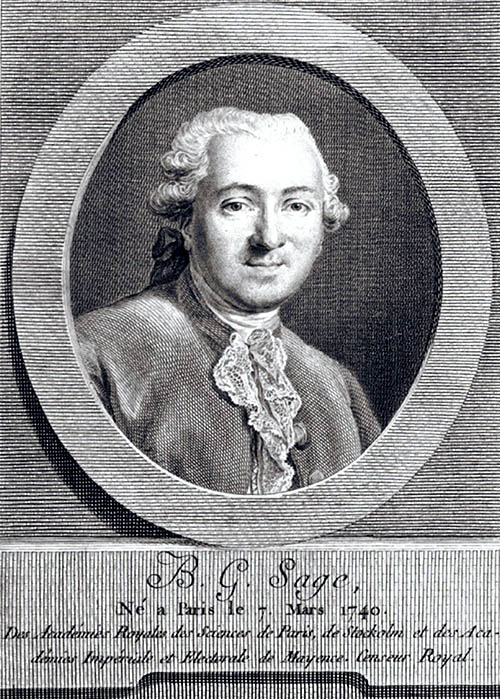Balthazar-Georges Sage
Today, history as an aging process. The University of Houston presents this series about the machines that make our civilization run, and the people whose ingenuity created them.
People often ask me to do programs on the creative output of people still living. But that's very dangerous, because history's fermentation process is incomplete. Maybe it's a bit like drinking May wine. That really came home to me yesterday as I thumbed through the Dictionary of Scientific Biography.I came across a remarkable article about French chemist Balthazar-Georges Sage (pronounced as Sazh.) The article begins,
Except as founder of the Paris [School of Mines] there is little reason to rate Sage as [important]. He published extensively, often hurriedly, and -- toward the end of life -- usually for self-serving purposes. The chief modern study of Sage describes his ... work as totally without value.
And it continues for seven pages. That kind of length is reserved only for really famous people. Von Neuman, Semmelweis, Edison, Boltzmann, Coulomb, Voltaire, Schrödinger all get less space. Why should a failure -- perhaps even a charlatan -- get such coverage?
So I went back into the dusty stacks and picked up a century-and-a-half old French biographical dictionary. Here, only thirty years after Sage's death, a similar story emerged. But now it was heavily coded. Outwardly, the article was laudatory. Between the lines, it was clearly damning Sage with honeyed words.
As a boy, Sage followed in the path of his pharmacist father. He also studied some chemistry and took an interest in minerals. He managed to develop contacts in the court of Louis XV. He even co-opted the King into placing him in the Academy of Sciences.
And Sage kept jockeying for position. He worked for a while with Lavoisier before he turned upon Lavoisier's advanced chemical ideas. When Sage announced that a certain lead ore was twenty percent hydrochloric acid, the Academy took some pains to prove that was completely false. Sage simply put on his Teflon coat and ploughed ahead. A few years later, a leading chemist remarked that Sage's failure to understand chemistry is what gave him such confidence in making rash claims. Sage, meanwhile seemed oblivious to his own shortcomings.
A lifelong royalist, Sage got through the French Revolution with only a little jail time. When the old phlogiston theory was debunked, he wouldn't let it go. And he kept propping up his status until he died (in the words of his biographer) as "an unregenerate royalist, a scientific fossil, and a pathetic hangover of the [old monarchy]."
Back then to my original bafflement: Why this long article deconstructing a minor figure? I can only guess. Perhaps the editors simply felt that the record had to be set straight.
Whatever the cause, it's pretty clear that too much of Sage's history had been written while he was still living. And that is why I dodge when I'm asked to talk about people who have not yet been absorbed into the web of the past.
I'm John Lienhard, at the University of Houston, where we're interested in the way inventive minds work.
H. Guerlac, Sage, Balthazar-Georges. Dictionary of Scientific Biography(C.C. Gilespie, ed.) New York: Charles Scribner's Sons, Vol. XII, pp. 63-69, 1975.
Biographie Universelle Ancienne et Moderne (Joseph, Fr. Michaud, ed.) Paris: Madame C. Desplaces; [etc., etc.] 1854.
